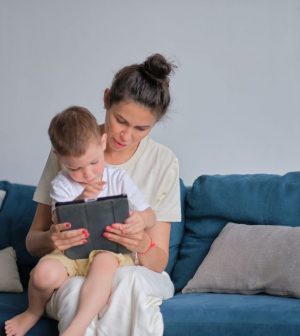- Could Your Grocery Store Meat Be Causing Recurring UTIs?
- Are You Making This Expensive Thermostat Error This Winter?
- Recognizing the Signs of Hypothyroidism
- 10 Strategies to Overcome Insomnia
- Could Artificial Sweeteners Be Aging the Brain Faster?
- Techniques for Soothing Your Nervous System
- Does the Water in Your House Smell Funny? Here’s Why
- Can a Daily Dose of Apple Cider Vinegar Actually Aid Weight Loss?
- 6 Health Beverages That Can Actually Spike Your Blood Sugar
- Treatment Options for Social Anxiety Disorder
Too Much Screen Time Harms Preschoolers’ Sleep, Behavior

Too much screen time can sabotage preschoolers’ sleep, potentially turning them into terrors around the house, a new study warns.
Bad sleep can exacerbate children’s struggles with poor attention, hyperactivity and moodiness, researchers reported Dec. 12 in the journal Early Child Development and Care.
Worse, kids can wind up in a downward spiral, with screen time and poor sleep feeding off each other.
“Our results suggest the presence of a positive feedback loop, wherein increased screen time and sleep disturbances exacerbate each other through cyclic reinforcement, heightening the risk of hyperactive attention problems, anxiety and depression,” said researcher Dr. Bowen Xiao, an expert in children’s socio-emotional functioning and developmental psychopathology with Carleton University in Canada.
For the study, researchers surveyed the mothers of 571 preschool children between the ages of 3 and 6 who were attending seven public kindergartens in Shanghai.
Moms reported the amount of time their kids spent with a TV, smartphone, computer or other screen device. They also answered questions to assess any behavioral problems their kids might have, as well as the quality and duration of their sleep.
“Our results indicate that excessive screen time can leave the brains of preschool children in an excited state, leading to poor sleep quality and duration,” said researcher Yan Li, an expert in preschool education from Shanghai Normal University.
Researchers also noted that prior research has indicated that screen time can lead to hyperactivity and emotional problems among kids.
This study suggests that screen time might be the reason why, researchers said.
“This poor sleep may be due to postponed bedtimes caused by screen viewing and the disruption of sleep patterns due to overstimulation and blue-light exposure,” added lead author Shujin Zhou, a doctor of psychology with Shanghai Normal University.
“Screen use might also displace time that could have been spent sleeping and increase levels of physiological and psychological arousal, leading to difficulties in falling asleep,” Zhou said in a journal news release.
These results could point the way toward future treatments for hyperactivity and mood problems among young children, Zhou said.
“The implications of our study are two-fold: first, controlling screen use in preschool-age children can help alleviate behavioral problems and poor sleep quality, and second, sleep interventions and treatments can be effective in mitigating the adverse effects of screen time on behavioral issues,” Zhou noted.
More information
The U.S. Centers for Disease Control and Prevention has more about poor sleep and children’s mental health.
SOURCE: Taylor & Francis Group, news release, Dec. 12, 2024
Source: HealthDay
Copyright © 2026 HealthDay. All rights reserved.










